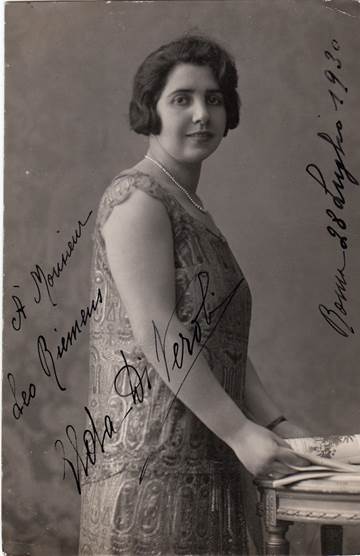 (photo courtesy Charles Mintzer collection)
(photo courtesy Charles Mintzer collection)ELDA DI VEROLI, remembered by Luciano Di Cave
(all photos from the collection and copyright of Luciano Di Cave except the one below, many more photos in our youtube clip on Di Veroli)
 (photo courtesy Charles Mintzer collection)
(photo courtesy Charles Mintzer collection)
Luciano Di Cave has agreed to more interviews about some singers he has known and admired personally. After the very popular article on Lina Pagliughi we now want to introduce to our readers the soprano Elda Di Veroli who was born in Rome (1892) as Luciano (1926) was himself.
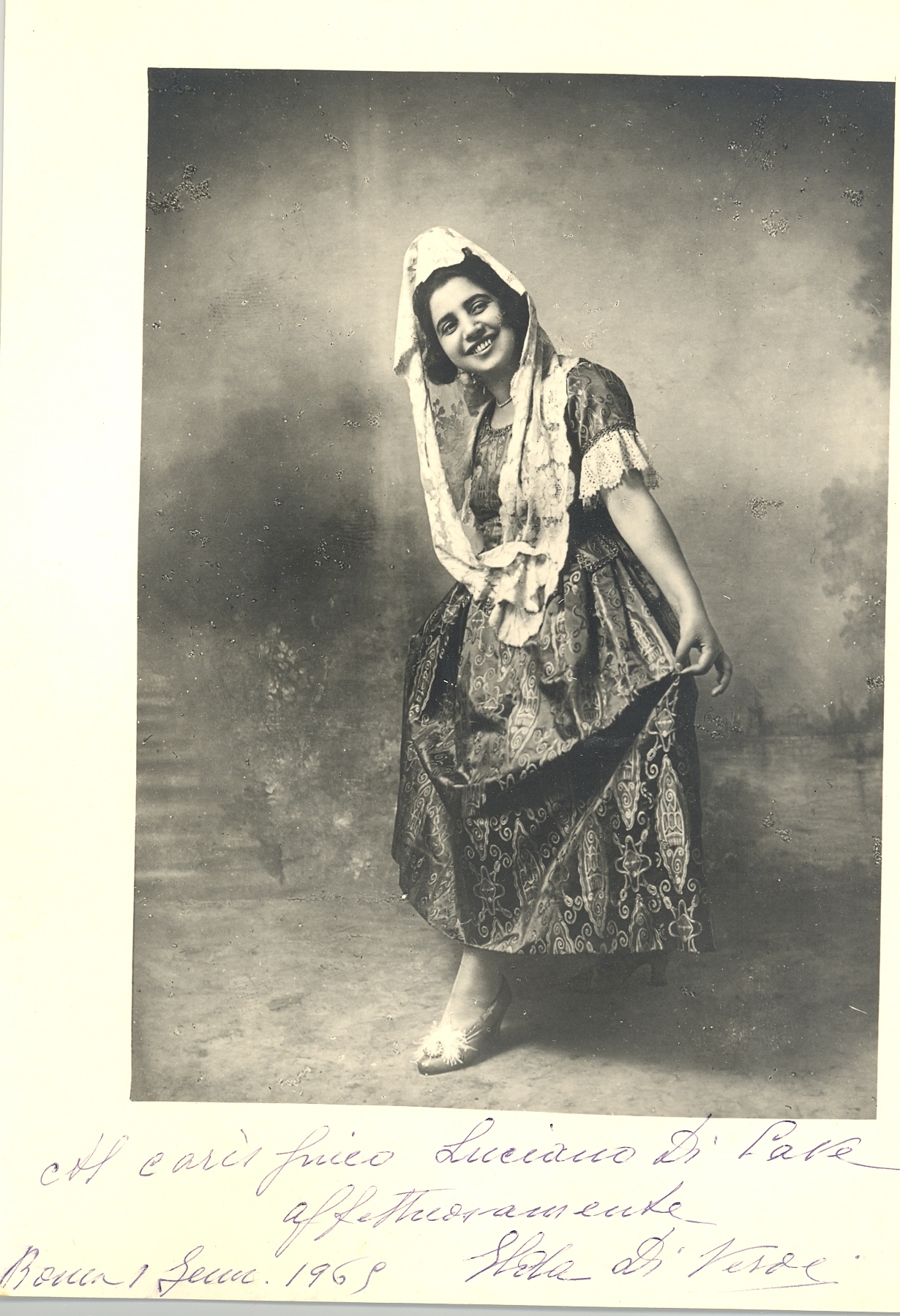
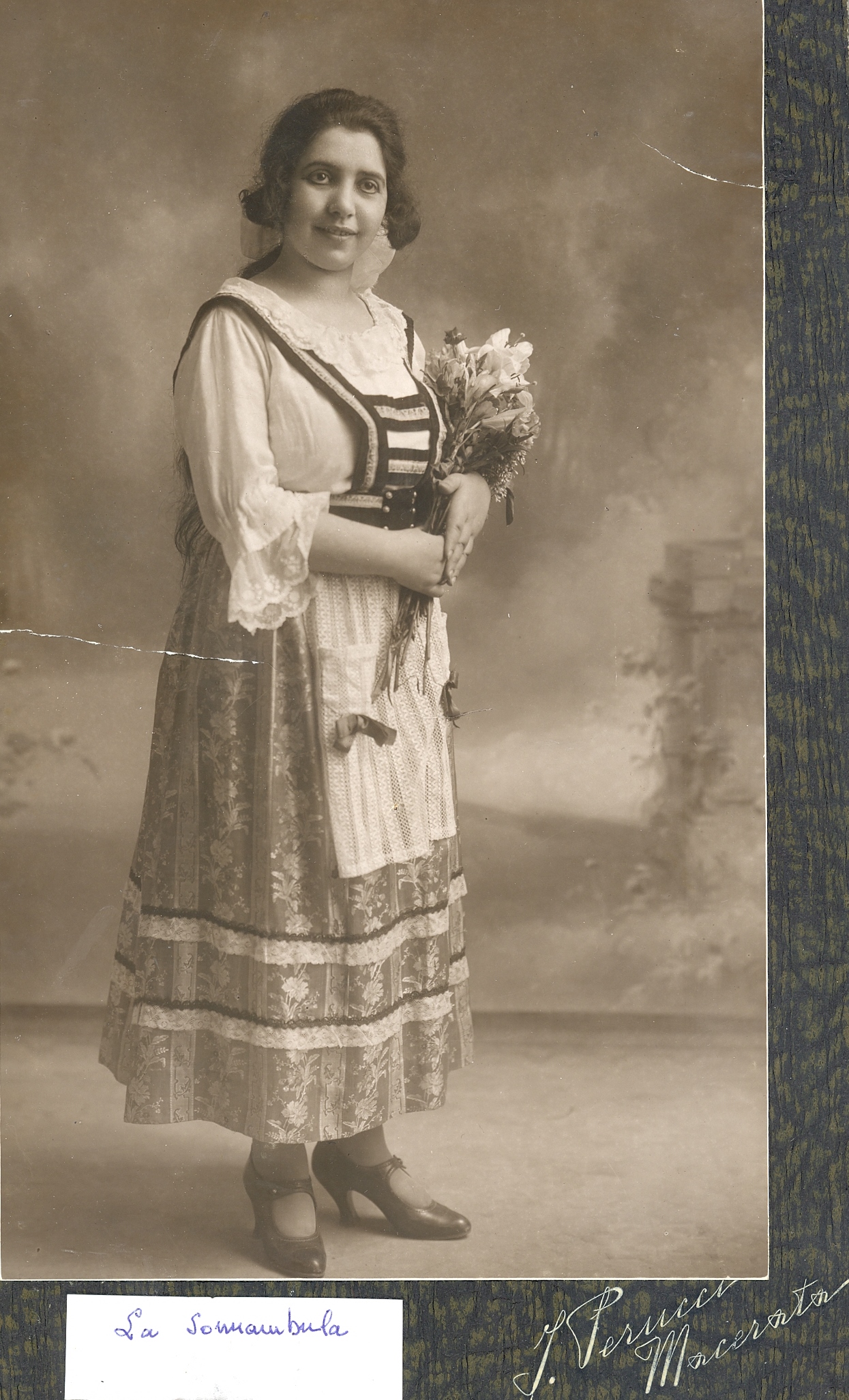
At the very beginning of 1945 my father, walking in a central street of Rome, heard a voice: “Signor Di Cave!”. My father turned back and saw a man thirty, thirty-five years old, who was smiling at him.
- You cannot remember me, - he said, - but when I was a student I used to come to your shop and buy (and more often sell) the books for the school. My name is Armando Dadò.
My father was pleased that his person had awakened in signor Dadò fine recollections and asked him about his present life.
- I am happy you have escaped from the dangers of the war, - replied Mr.Dadò, - I am a singer and at present I sing at Teatro dell’Opera.
- It is a lucky coincidence, - my father said, - because my son, who is 19 years old, is fond of opera and voices and intends to study for singing.
- I should be happy to listen to him - was the answer and they made a date for an audition.
I went with my father to Dadò’s house, he listened to me and said that there was a voice, pleasant but rough. I needed a teacher and he suggested Elda Di Veroli, whom he knew very well having sung often with her. So I presented myself to Elda Di Veroli and became one of her students. She was then 53 years old and had retired from the mid-thirties. It is common opinion that she was forced to retire by the racial laws, but this is not true. She told me she had retired some years before, to enjoy complete privacy and relaxation. Her career had been successful and her name was known in Italy and Europe. In that period she was still receiving letters from her fans, asking photos and autographs.
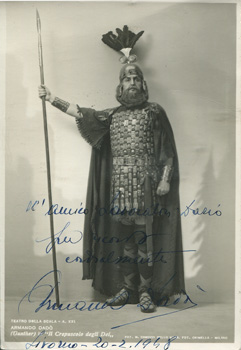 (Armando Dado as Wotan)
(Armando Dado as Wotan) 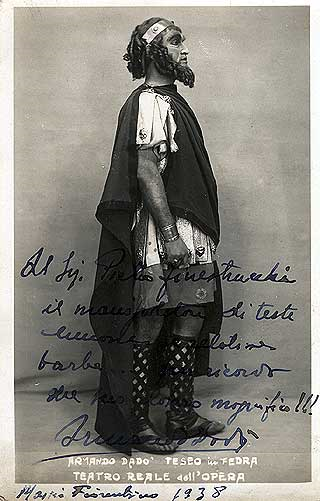 (idem as Teseo in Phedra, Rome opera)
(idem as Teseo in Phedra, Rome opera)
To make my task easier (or more difficult), Rudi v.d. Bulck the editor of the webzine prepared a series of questions to which I had to answer:
1. When was Elda Di Veroli born? Did she come from a musical family? Where did she live in Rome?
Elda Di Veroli was born in Frosinone, an important town of the Lazio region (there is a small country, not far from Frosinone, called Veroli), but she had always lived in Rome. She belonged to a family which had a real tradition in the musical field. Her sister Margherita was an excellent violinist and one of her brothers, Manlio (click here to read more about this brother), had settled in London as a conductor, music teacher and, above all, composer. His in fact are in fact the beautiful songs that Beniamino Gigli brought to celebrity, such as “Ritorna amore, Casarella, O grande sommo Iddio, etc.
;
In Rome Elda lived in a spacious apartment in the Via Crescenzio, with two sisters and one of her brothers. Via Crescenzio is a street in the Prati quarter, that, till the fifties, was one of the finest and most quiet in Rome. Not far from Vatican it is shaded by high trees and it is long and large. I have always loved this street and when I wrote my book “Addio Davide!” I located Davide’s house just in the Via Crescenzio.
2 With whom did she study? Could you tell us something more about her teacher?
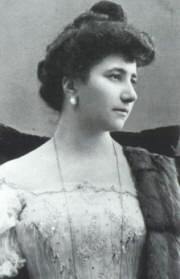 (Ceresoli)
(Ceresoli) 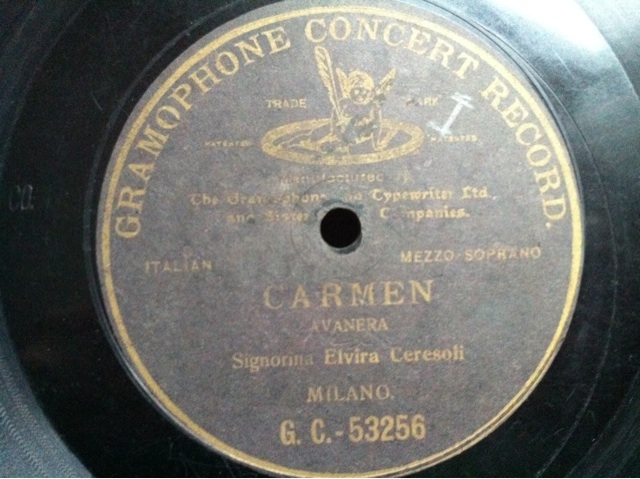
Elda Di Veroli studied with mezzo Elvira Salvatori Ceresoli. I have read of some of her performances in Genoa in 1891 and 1896, in Parma, Teatro Regio in 1898 she sang in Lohengrin with Cremonini and Kruszelnicka, on February 19 1898 she sang in Un Ballo in Maschera. In the season 1908-09 she sang at San Carlo in Naples, in 1894, 1901 and 1909 she sang at Teatro Costanzi in Rome The critics were always favourable. We know her for some important recordings, such as the duet from Favorita with De Luca and the duet from Lohengrin with Ferrani. There are solos on other black G&Ts. About her school, I know that, besides Elda, another one of her pupils was Maria Laurenti.
3 When, where and in what role did Di Veroli make her debut?Was it an important theatre? Did she have to audition?
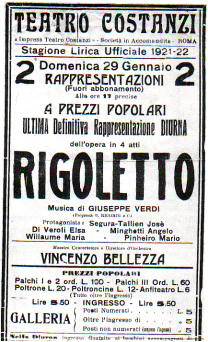
Elda Di Veroli made her debut in Rigoletto at the Teatro Traiano in Civitavecchia, a town near Rome with an important port. About the audition, yes, she had an audition and was immediately offered a contract. Her debut was a triumph, audience and critics were marvellous and she was reconfirmed for il Barbiere di Siviglia. She achieved another triumph and the town of Civitavecchia awarded her with a golden medal as a souvenir of her glorious performances. Soon later she was scheduled for Puritani in Viterbo, another important and historic town of the region and here she sang with a young tenor who debuted as Arturo: Giacomo Lauri Volpi. In the years to come Elda sang again with Lauri Volpi, in Montecarlo, in Rigoletto (with Mattia Battistini) and Bohème (Musetta) with Maria Ros. She could not conceal her displeasure at the fact that Lauri Volpi had never cited her name in the many books or articles he had written.
After the successful performance of Puritani Elda was scheduled by Emma Carelli for two performances of Don Pasquale at the Teatro Costanzi in Rome (later Teatro Reale dell’Opera). The two performances became eleven for the great success she achieved. Don Pasquale was an opera that suited perfectly to her voice and interpretation and with this opera she obtained a great success, some years later, at the Opéra in Paris.
4 Could you describe her career in Italy? What theatres did she sing in? Famous colleagues? What roles did she sing? Large repertoire or more restricted?
In Italy she sang in all the important theaters such as the Carlo Felice in Genoa, the San Carlo in Naples, the Petruzzelli in Bari, the Costanzi in Rome and the Donizetti in Bergamo. Perhaps the only important theater where she did not sing was at La Scala. Arturo Toscanini intended to call Elda for an audition but she didn’t accept his invitation. The reasons could be two: the first was the fear for the great conductor, the second was that in that period she was preparing an important performance of Lucia di Lammermoor at the teatro Adriano in Rome, with Galliano Masini.
Another reason, but this is only my opinion, is that the fame of Toscanini as “Tombeur des femmes” prevented her to know the Maestro. But, I repeat, this is only my opinion.
In Milan Elda sang at the Teatro Carcano, where, during a performance of Lucia di Lammermoor, she was greeted by a visit of the great Frieda Hempel, who was very enthusiastic of Di Veroli’s voice.
Elda sang with the most famous stars of opera : Stracciari, Galeffi, Fleta, Giorgini, Franci, Crabbè, Montesanto, Minghetti, De Muro Lomanto, Pederzini, Bettoni... the list could continue...
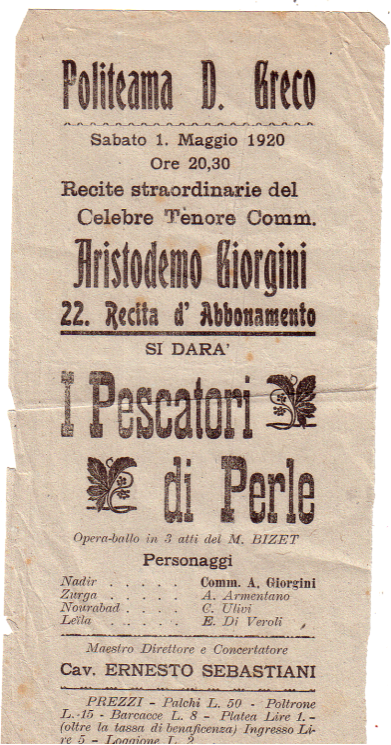
About her repertoire perhaps it was not large compared to some other artists, but it followed the tradition of soprano leggero: Lucia, Barbiere, Rigoletto, Sonnambula, Puritani, Don Pasquale, Elisir d’amore, Bohème (Mimì and Musetta), Pearl Fishers, Linda di Chamounix, Masked Ball (Oscar, that once she sang with Aureliano Pertile). She sang also in Pagliacci, very rarely because she didn’t like the character of Nedda, and in Traviata, not often because she was too involved in the moving drama of Violetta. She always refused to sing Butterfly, considering the role of Cio-Cio-San too heavy for her voice.
5 What about her career outside Italy?
Outside Italy she sang in Montecarlo, Amsterdam, Rotterdam, Aja, Utrecht, Barcelona, Sevilla, Malaga, Madrid, Lisbon. In Poland she sang in Warschau and she remembered her visit at the Jewish Ghetto, then still full of life and people.
Click here for a selective chronology of her career
6 Why did she never sing in South or North America?
Though ready to sing in every part of Europe, she never agreed to cross the Ocean. Three times she was requested to sing in South and North America and three times she refused. One of the managers who had listened to her performances exclaimed: “Oh! if Galli Curci had your “E” ! (And she could arrive also to “F”, as can be heard from the Sonnambula record.)
7 When and where did she end her career?
I don’t know exactly where and when she ended her career. I know that in 1931 she was in London for concerts and in 1933 she sang in Genoa and at San Carlo of Naples. I think she retired towards 1935-36. She never explained the reasons of her retirement but I think it was a matter of character. She was of a kind disposition and, probably, she was tired to fight against the arrogance of ambitious colleagues. In my article on mezzos, speaking of Pederzini, I mentioned the episode when the famous Gianna rescued Elda from an ignoble action. Another episode occurred in the thirties and though I know the names of the protagonists and the theater where it happened, I cannot reveal them: Elda had been scheduled for some performances of Rigoletto but another soprano longed for the role of Gilda. This soprano (a famous one) was linked to the “impresario” and claimed to sing Gilda, replacing Di Veroli. For a strange coincidence this soprano and Elda were lodging in the same hotel and their rooms were contiguous, so Elda and her sister listened to all the unpleasant rows. The soprano sang in some performances of Rigoletto, not all because Elda sang in the last two. It was a great satisfaction for Di Veroli to hear some of the members of the orchestra exclaim: “Thank God! Di Veroli has all the necessary notes!”
Two episodes cannot explain completely the reluctancy of Elda to continue her career, but, being a single woman lacking protection and recommendations, she preferred to give up her career at the best of her vocal condition. Of course I have expressed only my opinion, but a few years later, in 1938, racial laws would have indeed compelled her to leave the stage.
8 As a Jewish artist did she survive the atrocities of WWII? And her family did they survive?
Luckily she survived to the atrocities of WWII, hiding herself during the German occupation of Rome. Her family survived too. My wife who had known Elda in 1940-41 had a great affection for her and, during the worst period of the war, (1943-44), she was very near to her.
9 How long did you study with her? Did she have many students? Anyone who made a career? Did she ever talk to you about her colleagues?
I studied with Di Veroli nearly one year. She had always many students in her school and, besides her ability as a teacher, it was her simpathy to conquer the pupils. She had in her school Veriano Luchetti, his voice was already pitched, but she worked to improve it. She was a good musician and played the piano pretty well, so she didn’t need an accompanist.
Her best pupil was soprano Angelica Tuccari, who enjoyed a good career both in opera and concerts. She was very active in RAI and sang in operas, oratorios, concert, ancient and modern music. Many years ago, invited to a RAI broadcast, Tuccari had affectionate and thankful words for her teacher and introduced her voice by the record “Io son Titania” from Mignon.
Di Veroli talked about some of her colleagues and admitted that she and another contemporary “soprano leggero” had always to fight against the fame and popularity of Toti Dal Monte.
Rosa Raisa, sending her a post-card compared her beautiful voice to that of Dal Monte and this comparison recurred very often. Elda met Dal Monte only once and the meeting was rather cold from both sides. Nevertheless she admired Toti, as she was very objective. Elda had very good relations with Mercedes Capsir, who, once, invited her to sing in a company sponsored by Capsir herself. Elda accepted and sang in “il Barbiere di Siviglia”. Moreover, some years after, Capsir wrote to Elda offering her a professorship in the Conservatory of an Italian town. Unluckily Di Veroli, who was still in her career, could not accept.
I remember a party where my wife and I were invited with Elda, by a family who was fond of opera and singers. There Elda happened to meet Benvenuto Franci and their meeting was really moving. Both talked of old times and of the many Lucias, Barbieres and Rigolettos they had sung together.
Beniamino Gigli, who knew her family very well, especially her brother Mario, had sung with Elda in some concerts. When, after the war, he met her, he embraced her, thanking God she had survived the German persecution. During the period I was studying with her Elda went to a party where she met and knew Graziella Pareto.
Elda herself begged her to sing an aria. Pareto chose “Ah non credea mirarti” from Sonnambula, and Elda admired an art that belonged to another era.
Another singer she had often met was the tenor Nicola Fusati… Not for artistic reasons but...because he was her dentist! In fact Fusati, after retiring from the stage had resumed his first career and was again practising the profession of dentist!
10 Could you expand on her recording career? How many records did she make, for what companies? What is her rarest record? What is her best record (are her best records) in your opinion?
Elda Di Veroli has had a good recording career. She recorded several sides for COLUMBIA in 1928-29, with the electric process. Click here for a discography
Her voice is well-recorded and the arias belong to her traditional repertoire : Barbiere, Lucia, Rigoletto (duets with Molinari), Puritani and Mignon. The records are all 10 inches and at the very beginning (more or less around 1928) they appeared in their original form. Soon after Columbia made (not only for Di Veroli) a great confusion changing the couplings and breaking their continuity. The side of Manon was coupled with "Se tanto in ira agli uomini" from Linda di Chamonix sung by Cristy Solari. I didn't know anything about other records by Elda, and great was my surprise when she showed me some 12 inch records released in England towards 1924-1925 by yhe label "DUOPHONE". They are recorded acoustically but introduce the voice of the singer not only in arias from Lucia and Puritani but show her ability in the colorature repertoire with arias from Dinorah, Lakmé and Zauberflote.
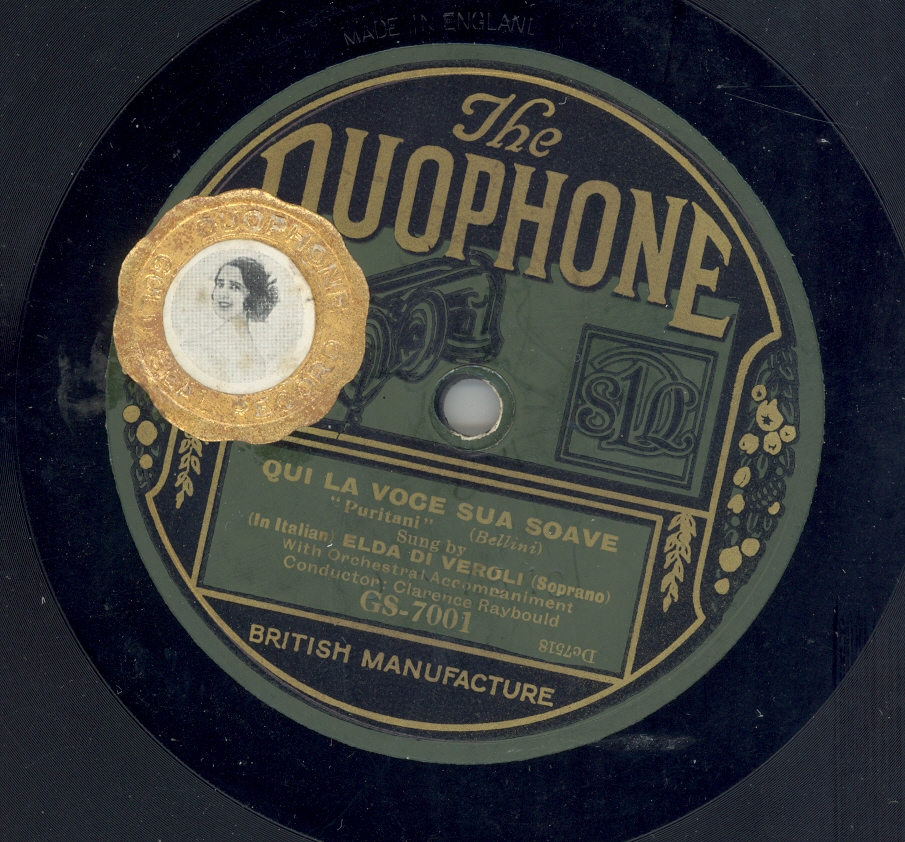
Elda also possessed a test proof of "Sempre libera" but hélas it was broken. Many years later in the seventies I knew the great collector Richard Bebb (see our youtube clip for a photo) and through his attention for the English market I found most part of the Duopohone records in their original form. I can say all but one -though I have a recording on tape- plus another one Elda had completely forgotten about : two arias from Sonnambula, arias neglected by her Columbia records. Her best record in my opinion is "Qui la voce" and "Vien diletto" from I Puritani in the Columbia version.
11 How would you describe her voice? Did you ever hear her live? What were your impressions?
I have never heard Elda Di Veroli in her best period, when she retired from the stage I was only nine or ten years old. I had some opportunities to listen to her in 1945-46, when she was still able to sing “Caro nome” in tune. On that occasion she sang, for us students, also “Ah fors’è lui” from Traviata and (in Italian) “Leise leise” from Freischütz. (About “Caro nome” Elda told me to have recorded it for Columbia, but for a little fault in the orchestra it remained unpublished). I have spoken with many people who had heard her in the theater : the same virtues of Toti Dal Monte, a voice limpid and shrill, but able, more than Toti, to surmount the dfficulties of coloratura and a great talent in the high spheres. She was very clever in “canto fiorito” and “agilità legate”, all executed with great precision and real musicality. She had a real virtue: to avoid the white and colourless timbre of many “soprani leggeri” and preferred a rounder sound, more full and velvety.
12 Some more personal questions as to Di Veroli the woman? Did she ever marry? As a
person was she well-off or did the war ruin her? Was she a happy woman? When did you last see her? When did she die?
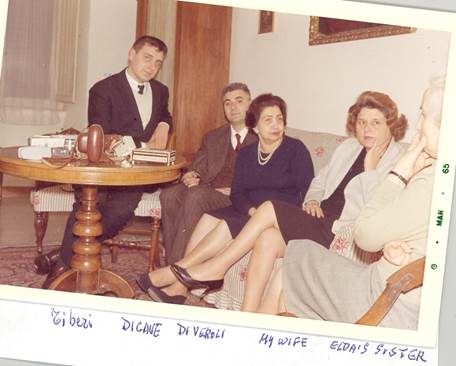
Elda Di Veroli was a very pleasant woman, very simple and spontaneous. The war didn’t ruin her, and she overcame all the difficulties and the dangers of the war. I suppose that her financial condition was pretty good and she always led a dignified life. Judging from her behaviour I think she was a quiet and satisfied woman, even if she never married. Hers was a large family, so she had always love and attention from sisters, brothers and nephews. My wife and I used to visit her very often, and we met her till a short time before her death. She died in her house in Rome on February 25, 1981.
OUR YOUTUBE TRIBUTE TO DI VEROLI
These are excerpts from a radio programme "Voci e personaggi" going back to 1968. This series also featured the baritone Attilio d'Orazi and our friend Luciano di Cave as guests.
!! There's a small technical interruption of a few seconds at 9.30, at the end of ombra leggiera
FIRST CLIP
1. You can hear Elda Di Veroli talk about her career with comments from Luciano on her career and recordings. Di Veroli sings OMBRA LEGGIERA (at 5.30) and ALFIN SON TUA (at 13.22)
2. Luciano talks about her records at 12.31
3. D'Orazi talks about his career at 10.00 till 12.22
SECOND CLIP
Elda Di Veroli talks about the difference in singing opera and singing in concert. At 3.42 she sings Mozart's DIE HOLLE RACHE(in Italian), you can also hear Attilio d'Orazi and Luciano Di Cave